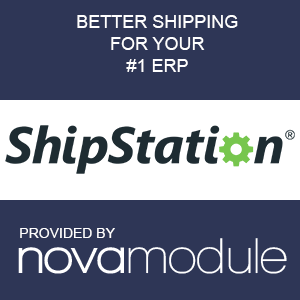ShipStation Integration with NetSuite
ShipStation is a leading web-based shipping software that helps online retailers streamline their order fulfillment, wherever they sell and however they ship.
Using the ShipStation connector for NetSuite, online retailers can combine the powerful shipping software and the proven back office features of NetSuite.
Nova Module’s ShipStation Connector for NetSuite is built on a modern iPaaS platform (integrator.io) offered by Celigo.
Key Benefits
- Complements NetSuite with a feature-rich functionality that allows order importing from over 90 selling channels, auto-selecting shipping preferences, custom fulfillment rules, multi-carrier label creation (30+ carriers including USPS, UPS, FedEx, DHL), automatic shipping confirmations, and more.
- State-of-the-art field mapping capability between systems.
- Out-of-the-box solution can be customized to fit specific business needs.
- Enterprise-strength integration that supports large transaction volumes.
- SaaS subscription product built on a true iPaaS platform.
Customer Quote
“Nova Module met our needs in an exceptional way with the ShipStation to NetSuite connector, both with the end product and in the development process. They were uniquely responsive and accommodating to us as the customer. We will use Nova Module again as they’ve set the bar high for product quality and customer service.” Richard Ashley, Head of Business Analysis and Development, Magnolia Market
– Richard Ashley
Export Sales Orders from NetSuite to ShipStation, Import fulfillment data from ShipStation into NetSuite, export product data updates from NetSuite into ShipStation
USE CASE: SYNC ORDER DATA FROM NETSUITE TO SHIPSTATION
- Sales Order Export – Direction: from NetSuite to ShipStation Online retailers can easily identify sales in NetSuite that need to be exported out of NetSuite and imported into ShipStation for further fulfillment. It is done adjusting an already created saved search in NetSuite. Orders can be split into multiple orders based on an item level as well as based on a sales orders level as long as there is an identifier – e.g. channel field – “Shopify,” or “Amazon,” or “eBay,” etc.
- Fulfillment Import – Direction: from ShipStation to NetSuite – Upon fulfilling orders in ShipStation, online retailers can easily import fulfillment data (e.g. tracking number and fulfillment details) from ShipStation to NetSuite. An order in ShipStation can either be marked Fulfilled or Shipped so a proper option should be selected in the connector setting to “tell” the connector to use the right record.
- Product Updates Export – Direction: from NetSuite to ShipStation – Online retailers can easily designate items for which product data should be updated from NetSuite to ShipStation. ShipStation API currently (As of March 2017) allows only products updates (not product create function).
NOTE: Field mappings are possible as long as such fields are technically mappable (e.g. exposed in the API).
USE CASE: SYNC ORDER DATA FROM SHIPSTATION TO NETSUITE
- Sales Order Import – Direction: from ShipStation to NetSuite. Online retailers may already have ShipStation configured to sync orders from other channels / systems into ShipStation natively. With the help of a reverse integration app, merchants have an option to import such orders into NetSuite from ShipStation.
- Inventory Check – Direction: from ShipStation to NetSuite. If the inventory quantity needs to be checked against NetSuite before the shipment takes place, the solution can be configured to check the inventory quantity in NetSuite and flag orders that can be shipped in ShipStation.
- Fulfillment Import – Direction: from ShipStation to NetSuite – Upon fulfilling orders in ShipStation, merchants can easily import fulfillment data (e.g. tracking number and fulfillment details) from ShipStation to NetSuite.























